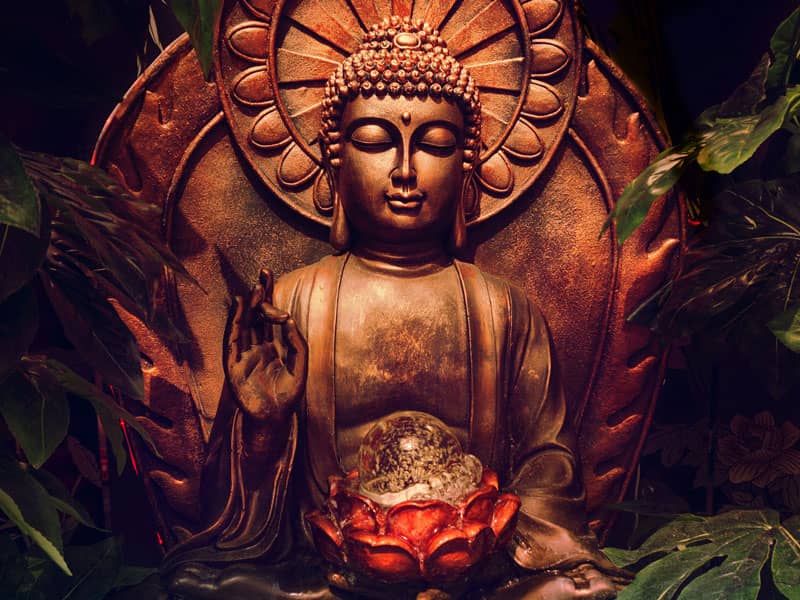The slogan "Be grateful to everyone" is about making peace with the aspects of ourselves that we have rejected. Through doing that, we also make peace with people we dislike. More to the point, being around people we dislike is often a catalyst for making friends with ourselves. Thus, "Be grateful to everyone."
If we were to make a list of people we don't like--people we find obnoxious, threatening, or worthy of contempt--we would find out a lot about those aspects of ourselves that we can't face. If we were to come up with one word about each of the troublemakers in our lives, we would find ourselves with a list of descriptions of our own rejected qualities, which we project onto the outside world. In traditional teachings on lojong it is put another way: other people trigger the karma that we haven't worked out. They mirror us and give us the chance to befriend all of that ancient stuff that we carry around like a backpack full of granite boulders.
"Be grateful to everyone" is a way of saying that we can learn from any situation, especially if we practice this slogan with awareness. The people and situations in our lives can remind us to catch neurosis as neurosis, to see when we're in our room under the covers, to see when we've pulled the shades, locked the door, and are determined to stay there.
"Be grateful to everyone" is getting at a complete change of attitude. It does not mean that if you're mugged on the street you should smile knowingly and say, "Oh, I should be grateful for this," before losing consciousness. This slogan actually gets at the guts of how we perfect ignorance through avoidance, not knowing that we're eating poison, not knowing that we're putting another layer of protection over our heart, not seeing through the whole thing.
"Be grateful to everyone" means that all situations teach you, and often it's the rough ones that teach you best. There may be a Juan or Juanita in your life, and Juan or Juanita is the one who gets you going. They're the ones who don't go away: your mother, your husband, your wife, your lover, your child, the person that you have to work with every single day, part of the situation you can't escape.

| ||
| "Be grateful to everyone" means that all situations teach you, and often it's the rough ones that teach you best. | ||
 |
These situations really touch you because there's no pat solution to the problem. You're continually meeting your match. You're always coming into a challenge, coming up against your edge. There's no way that someone else can tell you exactly what to do, because you're the only one who knows where it's torturing you, where your relationship with Juan or Juanita is getting into your guts. Others don't know. They don't know when you need to be gentle, when you need to be more clear, when you need to be quiet, and when you need to speak.
No one else knows what it takes for another person to open the door. For some people, speaking out is opening the door a little wider; for other people, being still is opening the door a little wider. It all has to do with what your ancient habitual reaction is to being in a tight spot and what is going to soften the whole thing and cause you to have a change of attitude. It's the Juans and Juanitas who present us with these dilemmas, these challenges.
The main point of "Be grateful to everyone"--the "dig"--is that you want to get rid of the situations that drive you most crazy. You don't want to be grateful to them. You want to solve the problem and not hurt anymore. Juan is making you feel embarrassed, or degraded, or abused; there's something about the way he treats you that makes you feel so bad you just want out.
This slogan encourages you to realize that when you've met your match you've found a teacher. That doesn't necessarily mean that you shut up and don't say anything and just stand there breathing in and out, although that might be exactly what you do. But [this practice] is much more profound than that. It has to do with how you open in this situation so that the basic goodness of Juan and Juanita and your own basic goodness begin to communicate.
Something between repressing and acting out is what's called for, but it is unique and different each time. People have the wisdom to find it. Juan and Juanita have the wisdom, you have the wisdom, everyone has the wisdom to know how to open. It's inherent in all of us. The path of not being caught in ego is a process of surrendering to situations in order to communicate rather than win.
Compassionate action, compassionate speech, is not a one-shot deal; it's a lifetime journey. But it seems to begin with realizing that when Juan or Juanita is getting to you, pushing every button, it's not as simplistic as just eating it, just being a worm, "Okay, let them attack me." On the other hand, it's not as easy as just saying, "I'll get him." It's a challenge. This is how the koan appears in everyday life: the unanswerable questions are the greatest teachers.

